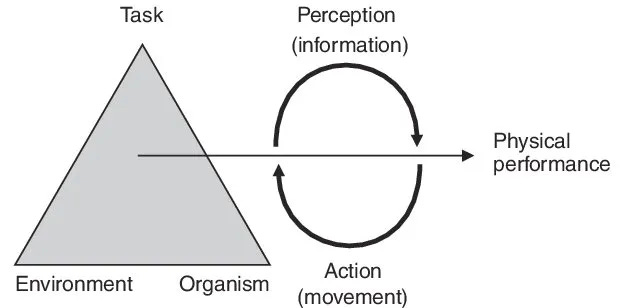What is Ecological Psychology?
Why should coaches understand this concept? Will it improve your coaching?
Ecological psychology is a branch of psychology that has gained increasing attention in recent years due to its unique approach in understanding the relationship between an organism and its environment. The field emphasizes the importance of the environment in shaping behavior, perception, and cognition. Ecological psychology views perception and action as inseparable and argues that perception is a form of action.
One of the key concepts of ecological psychology is the idea of affordances. An affordance is a feature of the environment that offers an opportunity for action. For example, a chair affords sitting, a door affords opening, and a ball affords throwing. Affordances are not inherent properties of an object but are dependent on the relationship between the organism and the environment.
Ecological psychology has many use cases, including in sports training and coaching. By understanding how athletes interact with their environment, coaches can design training sessions that are challenging, engaging, and promote player development. As such, ecological psychology is becoming increasingly popular in sports training and coaching.
One of the most effective ways in which ecological psychology can be used in sports training and coaching is through the design of training drills. Coaches can use ecological psychology to design drills that replicate game scenarios, allowing players to develop their decision-making abilities and game sense. This approach is based on the idea that perception and action are inseparable and that by designing drills that replicate game scenarios, players can develop the skills necessary to succeed in real-game situations.
Another way in which ecological psychology can be used in sports training and coaching is through the introduction of physical constraints during training sessions. This approach promotes creativity and innovation by forcing players to adapt and problem-solve. By introducing physical constraints, coaches can help players improve their ability to read the play, make quick decisions, and adapt to changes in the game situation.
Chaos theory and dynamic systems theory are also closely related to ecological psychology. Chaos theory emphasizes the importance of nonlinear relationships and unpredictability in complex systems. Dynamic systems theory argues that behavior emerges from the interaction between the organism and the environment, and that behavior is constantly adapting to changing conditions.
Ecological psychology can be viewed as a form of dynamic systems theory, as it emphasizes the importance of the organism-environment relationship in shaping behavior. Chaos theory is also relevant to ecological psychology, as it emphasizes the importance of unpredictability and nonlinearity in complex systems. By understanding the principles of ecological psychology, coaches and athletes can develop training programs that promote player development and success.
While Ecological psychology is a promising approach for reasons mentioned above, that doesn’t mean it doesn’t have its counterarguments against its use in sports coaching. However, these counterarguments can be addressed through careful implementation and consideration of the approach's potential benefits.
One counterargument against the use of ecological psychology in sports coaching is that it may not allow for enough individual variation among players. Critics suggest that by designing training sessions and drills that replicate game scenarios or introduce physical constraints, coaches may not be taking into account the unique abilities and needs of individual players. However, this critique can be addressed by understanding that ecological psychology is not a one-size-fits-all approach. Coaches can tailor their training sessions to meet the needs of individual players or groups of players. By providing additional guidance or support for players who struggle with certain skills or abilities, coaches can ensure that all players are developing the necessary skills to succeed in the game of hockey.
Another counterargument against the use of ecological psychology in sports coaching is that it may not be effective for developing specific technical or tactical skills. Critics argue that by focusing on game scenarios or physical constraints, coaches may be neglecting key technical or tactical skills necessary for success in the sport. However, it is important to note that the use of ecological psychology is not intended to replace traditional technical or tactical training. Instead, it can be used in conjunction with these training methods to promote a more holistic approach to player development. By combining technical and tactical training with situational training, coaches can help players develop the skills and decision-making abilities necessary to succeed in the game.
One of the strengths of ecological psychology in sports coaching is that it emphasizes the importance of decision-making and game sense. By designing training sessions that replicate game scenarios or introduce physical constraints, coaches can help players develop their decision-making abilities and game sense. This is important because decision-making is a critical component of successful performance in sports. Studies have demonstrated the effectiveness of the constraints-led approach in improving decision-making abilities in soccer players (Davids et al., 2008) and perceptual-cognitive abilities in soccer players (Memmert et al., 2013). These studies provide evidence for the potential benefits of the approach in sports coaching.
Ecological psychology is a promising approach that emphasizes the importance of the environment in shaping behavior, perception, and cognition in sports coaching. It can be used in training sessions to design drills that replicate game scenarios or introduce physical constraints, promoting creativity and innovation by forcing players to adapt and problem-solve. Counterarguments against its use in sports coaching are that it may not allow for enough individual variation among players and may not be effective for developing specific technical or tactical skills however, those concerns have been addressed and shouldn’t deter coaches from taking this approach. Nonetheless, by combining technical and tactical training with situational training, coaches can help players develop the skills and decision-making abilities necessary to succeed in the game of hockey. The use of ecological psychology in sports coaching offers a unique perspective on the relationship between the organism and the environment and can lead to improved athlete performance.




